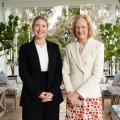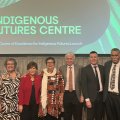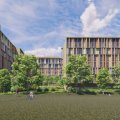Scientists have long explored the possibilities of technology but most of the work has never really pushed nature to its limits.
Associate Professor Michael Nielsen in the Special Research Centre for Quantum Computing Technology is curious to find out just what tricks the universe can perform.
Discovering the limits of what is possible in our universe entails the study of quantum physics, a set of fundamental laws that govern our universe but that have rather surprising implications on the smallest of scales.
Some of the properties of quantum physics are so surprising that it is almost impossible to understand them by thinking in terms of the conventional, everyday world around us. Even 100 years after the birth of the field, physicists still do not agree on what it all means.
However, Dr Nielsen is making progress in a specific area of quantum physics, the field of quantum information processing.
'Conventional computers are powerful but they pale in comparison with the potential of quantum computers - computers that process information using the most fundamental properties of the universe,' Dr Nielsen said.
'Quantum computers harness the strange properties of quantum mechanics to do calculations in a way impossible on a conventional computer.
'For example, existing computers are pushed right to their limits when simulating the most simple chemical systems. Predicting the properties of new materials is almost impossible.
It is often easier just to do the experiments and see what works.
'However, quantum computers will allow us to perform all sorts of simulations much faster and cheaper than experiments.
'Of course, experiments will still be required but the computation will guide us to make the experimental process more efficient.'
Unfortunately, quantum computers are still a long way from finding their way onto desktops.
Creating the first operating quantum computers is one of the tasks of the Special Research Centre for Quantum Computing Technology, which has one node at The University of Queensland.
Before those computers will be operating, physicists need to understand all of the principles behind their operation and what the computers will be capable of.
'We are trying to find out what bits and pieces need to be put together to make a quantum computer - what building blocks are required to unlock the power of the quantum world,' Dr Nielsen said.
'One of the major concerns about quantum computing is that slight disturbances can destroy the operation of the computer. That is why we need to build rigorous error-checking into the ?software' we create.'
Even when error-checking schemes are devised, implementing them is a formidable task.
However, the process will be much easier using the work of Dr Nielsen and his graduate students.
They have designed a 'compiler' that takes the steps of a computation, or algorithm, and creates the details of the program that is required to run any of the potential quantum computers being developed.
Regarded as one of the leading international researchers in his field, Dr Nielsen co-wrote the first graduate textbook in quantum information and quantum computing.
It is now the basis of courses in over a dozen leading universities including Yale and the University of Toronto and is currently being translated into Chinese.
Dr Nielsen's dynamic young group is intent on working as collaboratively as possible.
The work space he shares with his students sometimes seems like an ongoing discussion forum using an open plan with whiteboards and couches as the focus.
He hopes to use the $80,000 funding from the research excellence award to assist further collaboration with leading physicists from around the world by taking his students to upcoming workshops and bringing top international names to the University.
Media: For more details about the research of the nine winners contact Peter McCutcheon (07 3365 1088 or 0413 380012) or Jan King (07 3365 1120 or 0413 601 248)




